Published in 1933
Read for Jessie’s 3rd Persephone Reading Week, 20 Books of Summer and The Classics Club
Flush by Virginia Woolf was the readalong book for Jessie’s event, which suited me perfectly. I would have liked to read a second of the gorgeous grey-covered books, but time is pressing at the moment and happily, Flush is both short and delightful. The perfect read to open my 20 Books of Summer list.
I did not have the Persephone edition. The photo above is from Penguin’s Vintage Lives series; I have this version on my Kindle. But I also ordered a copy from the library. My library copy looks quiet and unassuming, patiently waiting with a companion to be returned to the reserve store.
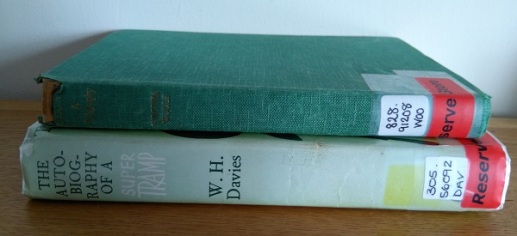
But inside it’s special. Printed in 1960 by Chatto & Windus, who took the Hogarth Press under their auspices in 1947, it sports that thick matt paper which is rarely found in modern books now. (Persephones are printed on wonderful paper too: theirs is thick, but smooth and pristine white. Part of my pleasure in Persephones is the enhanced reading experience offered by the quality of the paper.)
Open my library copy and this is the sight that greeted me: the good old-fashioned library system of an actual ticket in its little envelope!
And stamps on the library sheet, revealing its many travels. Is it just me who has a hankering for the old system? I was immediately transported to my primary school years. In my final year I was school librarian – a position of great responsibility and prestige. I had responsibility for the box containing the borrowers’ tickets and I got to stamp books as they were borrowed and replace books correctly on the shelves. How I loved it! (Until I got hauled over the coals for the most minor transgression which really wasn’t my fault. The trauma remains with me to this day. I digress…)
The downside of this nostalgic discovery in my library copy of Flush is that the rather special endpapers are defiled. The drawings by Virginia Woolf’s sister, the artist Vanessa Bell, are not visible. Never mind, thought I, they will be on the back inside cover as well…
Imagine my shock! WHY was that white sticker wantonly stuck across part of the drawing? (‘Real’ librarians, if anyone knows, please enlighten me.) So, just a portion of Bell’s endpapers to savour but that’s better than nothing. All of which is a preamble almost as long as the little book itself.
~~~~~~~
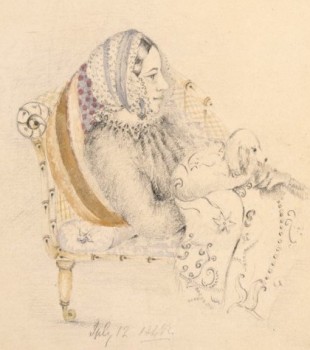
Flush is the fictional biography of the spaniel given to Elizabeth Barrett Browning in 1840. Through Flush we learn of Elizabeth’s years of ill health, spent cloistered in her bedroom and of her clandestine courtship with the poet Robert Browning, their elopement and subsequent years abroad, living very happily in Italy. We also learn of Flush’s ancestry, of his happy puppyhood in the country with Miss Mitford and his acclimatisation to life in a darkened bedroom. We hear about his jealousy of Mr Browning, his horrific dognapping and the torments inflicted by Italian fleas.
Flush is often described as a ‘light’ book: a word used by Woolf herself. In the Persephone forum piece on Flush, Woolf is quoted from her diary of 1932: ‘I shall take up Flush again to cool myself’ which implies that she used it as balm, some light relief. In fact, she refers to Flush frequently in her diaries at this time and invariably the references are negative. Four days after that December reference she writes:
‘I must write off my dejected rambling misery – having just read over the 30,000 words of Flush and come to the conclusion that they won’t do. Oh what a waste – what a bore! Four months of work and heaven knows how much reading – not of an exalted kind either – and I still can’t see how to make anything of it… Much good in it but would have to be much better… I can’t get back into Flush ever, I feel… I took it up impetuously after The Waves by way of a change: no forethought in me: and so got landed: it would need a month’s hard work – and even then I doubt it…’ The whole experience, she says, plunges her into one of her ‘grey welters’. (A Writer’s Diary p.191)
On January 21st she writes: ‘Well, Flush lingers on and I cannot dispatch him. That’s the sad truth. I always see something I could press tighter or enwrap more completely. There’s no trifling with words – can’t be done: not when they’re to stand “forever”.’ Finally on January 26th: ‘Well, Flush is, I swear, dispatched. Nobody can say I don’t take trouble with my little stories.’ (A Writer’s Diary p.194)
It’s fair to add that Virginia describes similar struggles with all her novels. None of her writing came easily. But I do wonder if she regretted writing Flush. Certainly it’s less radical in style and hence more accessible. Perhaps she felt that in Flush she was failing to break new ground. I would suggest though, that it’s a delightful way into Woolf’s writing. And for me at least, Virginia’s pain and effort were very worthwhile.
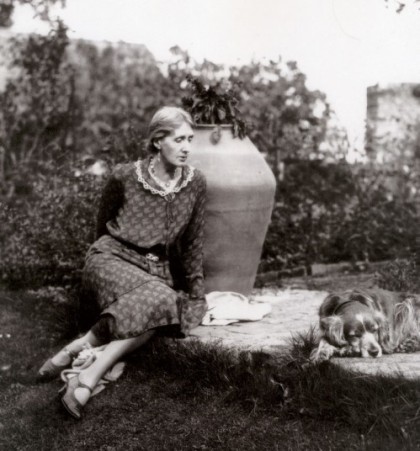
I loved Flush. It’s a joy to read: a warm, witty and affectionate book and beautifully written. It brought Dickens to mind in its rollicking descriptive passages – except that Virginia is describing the world through the eyes – and nose – of a dog. We have a canine perspective on nineteenth century town and country, and in the latter chapters, Italy.
Here is Flush in his puppyhood, walking with Miss Mitford in the country:
The cool globes of dew or rain broke in showers of iridescent spray about his nose; the earth, here hard, here soft, here hot, here cold, stung, teased and tickled the soft pads of his feet. Then what a variety of smells interwoven in subtlest combination thrilled his nostrils; strong smells of earth, sweet smells of flowers; nameless smells of leaf and bramble; sour smells as they crossed the road; pungent smells as they entered beanfields. But suddenly down the wind came tearing a smell sharper, stronger more lacerating than any – a smell that ripped across his brain stirring a thousand instincts, releasing a million memories – the smell of hare, the smell of fox.
I shall never look at a dog ambling about in the countryside in quite the same way.
Immediately I came to know Flush, my hitherto well-controlled yearning for a dog of my own resurfaced. It must be a spaniel, I declared. Out and about, all I see are spaniels. I have previously owned two spaniel crosses. Neither relationship fared well. (No fault of the dogs, I must stress.) That doesn’t put me off. I try thinking about Robbie, the young chocolate spaniel who lives nearby and whose misadventures might fill a book of their own already… Flush still shines out: the pinnacle of doggie excellence; the exemplar of all that a dog should be. I know in my heart of hearts that I will not be getting a dog any time soon. But my yearning is testament to the joyous character Virginia Woolf created!
My only criticism is of the final dispatching of Flush. Not dispatching to the printing press, as Virginia references in her diaries, but his death, in Italy, at a suitably ripe old age. There is a touching connection between Flush and Elizabeth and reference to how much he gave to her and yet it felt abrupt; it was – perfunctory. Is it possible that this is an indication of how tired Virginia was of the whole enterprise? Knowing how meticulous she was and the high standards she sought to maintain, it’s hard to believe she was so fed up that she just wrote him off: he was old and tired; it was time for him to go; he’s gone.
“Flush!” she cried. But he was silent. He had been alive; he was now dead. That was all.
Whatever Woolf’s intention, I was sad to have it happen and wished for a little more ceremony (and the removal of the very final sentence, which follows the quote I’ve included above). Perhaps that stands as testament to the life that Virginia was able to breathe into her fictional biography of an animal. I truly cared about him.
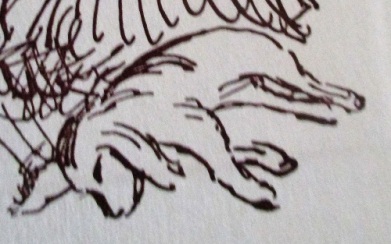
A few final thoughts. Firstly, many thanks to Jessie for organising this event and apologies for this late post. (It was 90% completed when circumstances dictated that it be set aside.) I hope there will be a fourth Persephone bonanza in the future! Secondly, this is clearly a very personal response to reading Flush. There is much more to be said about the wider themes within the book which can easily be accessed elsewhere and are worth a read in their own right. Thirdly, reading Flush brought to mind Lady’s Maid by Margaret Forster, published in 1990: a novel which also recounts the life of Elizabeth Barrett Browning, this time through the eyes of her faithful maid, Lily Wilson. This is one of my favourite novels by Forster and I recommend it for anyone seeking an alternative view of the lives of the two romantically entwined poets. And lastly, I am left wanting to read – not the complete handbook of spaniel care – but the works of the wonderful Miss Mitford: Mary Russell Mitford who not only brought Elizabeth Barrett Browning to life through her friendship and generosity in pressing Flush upon her, but also achieved fame in her own right through her lively sketches of life in Three-Mile Cross, the village in which she lived and from where Flush had sprung.
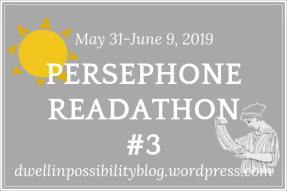
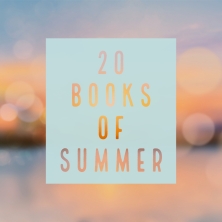
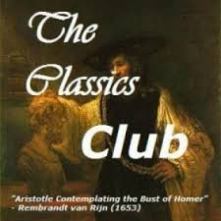







Ah! I never reached the dizzy heights of school librarian. But I ran my own library, with proper cardboard pockets and date stamps, as did my daughters after me. And you have sold Virginia Woolf well (and the joys of reading from a fine edition). Somehow, for an allegedly well-educated grammar school girl, I have some shocking gaps in my reading. To be put right! Soon!
LikeLiked by 1 person
Oh, I have vast gaps – cavernous spaces! But often I find that I’m glad to have missed reading a book at the ‘proper time’ in life; I get far more from all books now than I might have way back then. As for running your own library – I am deeply envious. Being a librarian was on my list of occupations for when I grew up. Along with air hostess, hairdresser and receptionist. And writer. Thank heavens for that last one – the rest present a damming portrait of a girl growing up in the sixties! 😱
LikeLiked by 1 person
I only mean my own modest collection of books. And I had few subscribers….
LikeLiked by 1 person
Oh, No, I wanted to write and illustrate my own books. Behold. I blog! With photos and everything….
LikeLiked by 1 person
And I blog too. We have each fulfilled those lofty ambitions! 😀
LikeLiked by 1 person
I had never heard of Flush, what an intriguing book and I have always been fascinated by the story of the languishing lady being rescued by the romantic poet!
LikeLiked by 1 person
Yes, her story really is the stuff of romantic fiction 🙂
LikeLiked by 1 person
Such a sweet book – a lovely change of pace for Virginia Woolf (although she grew to hate it) and for her readers.
LikeLiked by 1 person
It’s a shame that she was so dismissive of this one. It is charming, and useful as a foil against which to appreciate her other works.
LikeLike
Both Flush and Orlando are like little romps of a great mind at rest… but it probably didn’t feel like rest to her.
LikeLiked by 1 person
I have yet to read Orlando. But yes, that’s a good way to think of Flush.
LikeLike
Flush sounds like a lovely read and an alternative way of getting a bit of insight into the life of Elizabeth Barrett Browning.
At the moment I am actually making my second attempt to finish Virginia Woolf’s Mrs Dalloway. For some reason I find Woolf’s language a bit difficult to come to terms with and don’t always get the meaning. This time I will persevere though and finish it.
Oh, and I also worked in the school library as a kid. I don’t remember stamping the books though, just putting them back on the shelves. Perhaps I was not deemed responsible enough to do the actual stamping 😉
LikeLiked by 1 person
Well quite – I had accolytes who were only allowed to do the shelves! 😀 😉 Woolf’s language is difficult, which is why Flush is a joy as it’s totally accessible. I like Mrs Dalloway, though I need to be in the right headspace to read it (to read any Woolf other than Flush in fact). Hope you get to the end – and find it worthwhile if you do!
LikeLiked by 1 person
Haha, yes I suppose I must have been one of the acolytes 😀. I will let you know how I get on with Mrs Dalloway.
LikeLiked by 1 person
Oh Sandra, I’m so pleased you have written this lovely post. Firstly, that library copy is such a gem. Just imagine what a story there would be linking all its previous readers. Second, you have reminded me that my kindle version of Flush has been sadly neglected since the end of the Persephone week (what a great week to be part of – roll on number 4!). I got about half-way through, absolutely loving Woolf’s writing, and the book’s overall premise, but have since become distracted onto other books. So thank you for helping me get back to it! 😀
LikeLiked by 1 person
Getting distracted…. how easily it happens, Liz! I sympathise (and recall the kindle book I started reading very late last night which I had no intention of starting at all…) Hope you get back to it and enjoy the second half. I’m eagerly looking forward to The Fortnight in September, especailly after your glowing review 🙂
LikeLiked by 1 person
I really hope you enjoy TFIS as much as I did – can’t wait to read your review 😀
LikeLiked by 1 person
TFIS has so much to live up to. But I’m confident that it will do so!
LikeLiked by 1 person
🤞🏻🙏🏻😂💕
LikeLiked by 1 person
I loved Flush too – it certainly was a joy to read! I was also a school librarian and remember writing out those little tickets when a new delivery of books arrived. 🙂
LikeLiked by 1 person
Ah, now I don’t think I ever got to do that, Helen. Probably because my handwriting was dreadful! A pity that Woolf never got to know of the joy that Flush brought to so many readers.
LikeLiked by 1 person
I do intend to get around to Flush sometime. I did work in libraries in my younger days and loved it. It was the days of cardboard cards and index boxes and honestly that was quicker than the computers are nowadays, and of course no problems with electricity cuts or system problems! I have no idea why that copy of the book has a white card on the back though, we always just had the date paper at the front (can’t even remember what we called it) and it was only attached by a thin strip of glue at the top.
LikeLiked by 1 person
It’s rather like the dichotomy of real books and electronic books now, I suppose, Katrina. There are drawbacks and benefits to both. But I did love the simplicity and ritual that accompanied the old cardboard and date stamp system. That satisfying thump as the date was imprinted on the sheet…. 🙂
LikeLike
You did get me involved in the story of Flush and the eponymous volume. Injustice has certainly been done to Flush by both author and librarian —it’s nothing short of being callous. A great post on reading!
LikeLiked by 1 person
Thanks, Uma. It’s a pity that Virginia Woolf didn’t get to know how loved her little book became. And as for whoever stuck that white paper on the inside back cover…. sacrilege!
LikeLike
Well, I’m not a Woolf fan so will resist Flush despite your enticing review, especially since that death scene just sounds awful! But, much more importantly, I think we the people deserve to know more about your transgression… 😉
LikeLiked by 1 person
Would you believe me if I said that as I wrote that digression, you floated into my mind. I just knew you would ask! 😂 After careful consideration though, I shall say no more than it involved a necessary item left behind in the classroom cupboard and a sadistic teacher who would probably be suspended and possibly sacked had this sorry event occurred today. It’s important to maintain an air of mystery, I find 😂 😂
On another matter, wasn’t the Murray/Lopez partnership wonderful at Queens! If they could only reunite at Wimbledon 🎾🤔 I fear tennis etiquette means that it’s too late sadly. If you have any influence with your compatriot, now would be a good time to use it 😉
LikeLiked by 1 person
Hahaha! I’m even more intrigued now! 😂
Did you hear that when Andy was struggling to find a partner for the Mixed Doubles at Wimbledon, Billie Jean King tweeted that she’d laced her shoes and was waiting for the call? I would pay a year’s chocolate allowance to see that… 😀
LikeLiked by 1 person
Maybe if I add my annual chocolate allowance to the fund? Might they be tempted? 😀
LikeLiked by 1 person
Another excellent post. You will know how much I like your description of the paper; the library ticket; and the illustrations. This is one of hers that I have not yet read. I have taken my Penguin edition off my shelves and placed it ready to read after my current book.
LikeLiked by 1 person
Yes, for some of us there is enormous pleasure to be had in the physical and sensory elements of books and reading. Flush is a charming read, Derrick; quite different to her other work. A pleasant afternoon lies ahead of you, when you pick up your copy 🙂
LikeLiked by 1 person
Flush sounds lovely, regardless of whatever Virginia Woolf thought of the book.
I was a school librarian too and your post reminded me of how proud I was to stand behind the desk and stamp other student’s library cards.
Agreed, the beautiful paper and quality of old books is a joy 😀
LikeLiked by 1 person
It’s fascinating how many of us have school librarian roles in our past. Clearly the reading bug was already strong and evident in our formative years!
LikeLiked by 1 person
Yes, I enjoyed seeing other people’s comments about being involved in their school libraries too.
LikeLiked by 1 person
Hello Sandra – I am breaking my long silence to tell you that I think that is a security tag in the back of the book. It has been slapped in rather carelessly: on books which have a paper jacket they go on the outside of the book, but under the jacket, but this book of course has no jacket. I’ve continued to get great pleasure from your blogs, especially those about your surroundings: all the glory of Cornwall without my hair getting in a mess! best wishes Barbara
LikeLiked by 1 person
How lovely to hear from you, Barbara! And thank you – that makes sense. Not sure that you’ll see this reply so I’ll email later. Hope you and J are well 🙂
LikeLike
I thought I had read all of Woolf, but had not even heard of this one. I finally had a successful reading of “To the Lighthouse” by listening to it. (I guess that isn’t really a reading.) I don’t know why it was so off putting when I was younger.
LikeLiked by 1 person
I enjoy the audio version of Lighthouse too. Perhaps because someone else does the hard work of phrasing and intoning the complex prose so that it makes sense. I still count it as ‘reading’. Flush is the simplest and most accessible of her books and thus isn’t in the main pantheon. Not a book Woolf was proud of, sadly.
LikeLiked by 1 person
I think you have nailed it. It was the complexity of the prose that stopped me.
LikeLiked by 1 person
Being an un-doggie kind of person and a relative newbie where Woolf is concerned (the pleasing notion of a Woolf writing about a dog!) I’m unlikely to to put this on a must-read list, but I did enjoy your ruminations around it, the school library, the unfathomable defacements and the joy you had in exploring all the ins and outs!
LikeLiked by 1 person
Can’t believe I didn’t pick up on that canine connection! Glad you enjoyed the meanderings, Chris. Isn’t it just as well that we don’t feel the urge to read every book we read about – the mind boggles!
LikeLiked by 1 person
To Chris as well as Sandra — I’m willing to bet a few doughnuts that somewhere there is a dog named “Virginia Woof”!
Lovely post, Sandra. I haven’t read any Woolf in decades, and never ‘Flush’, but this sounds delightful.
As for all the stamps — in my university library I can occasionally find those library cards in the backs of books, and I’ve started collecting them (since the library no longer uses them). They make wonderful bookmarks.
LikeLiked by 1 person
Bookmarks – what a great idea! When I finally get my next dog – probably in my next life – I shall name him Virginia Woof. Which will be enigmatically shortened to something easier to use and more appropriate to his gender. (Though a male dog with a female name seems acceptable when I think of Woolf’s Orlando.) Something for me to muse upon when I need a break from manipulating booklists…. 😉
LikeLiked by 1 person
I have a firm rule. I don’t read books where pets die. I just can’t. Still, I enjoyed your post and can see the appeal of the book. And I did love the reminiscing about library books and the evidence of how they had traveled from hand to hand.
LikeLiked by 1 person
That sounds a sensible rule to me. And I’m glad you enjoyed the ramblings anyway, Kerry 🙂
LikeLike
There is something wonderfully authoritative about the person banging down the irrevocable date stamp!
How interesting that Woolf got so dejected about her work – sad too that it brought her so little joy.
LikeLiked by 1 person
Indeed, Carol – on both counts! Woolf was so passionate about her work and perhaps like most perfectionists, never satisfied. She strove to break new ground yet seemed so unsure of what she created.
LikeLiked by 1 person
You’re not the only one to miss the old ways of tracking library books. My mum worked in libraries all her working life. I worked as a library assistant for a while after university while I decided what I wanted to do. The modern electronic way has almost put an end to customers and library staff having a chat and exchanging book views – it’s impossible to ask the computer system what they think of a book, and it never tells me about other books that it has read and thinks I might enjoy.
And yes, the white sticker is an electronic tag that enables the system to track the book. When you’re the library assistant whose job it is to tag books, you lose your enthusiasm for positioning the tag early on!
LikeLiked by 1 person
Thanks Jan, Barbara was obviously right 🙂 I can see how it might be a bit monotonous, slapping the sticker in book after book. All the same – it hurt! And I agree about the loss of human contact. Our local library has just closed until the autumn when the local town council are taking on the running. I wait to see what changes there may be.
LikeLike
Oh nice thank you for this!! I am still discovering her works. I love the comments you made it about.
I will definitely add this on my list.
LikeLiked by 1 person
I’m glad you found it helpful, Zora 🙂 I still have plenty to discover too!
LikeLike